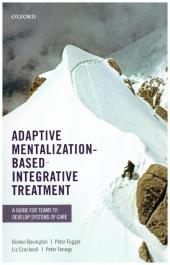 Neuerscheinungen 2017Stand: 2020-02-01 |
Schnellsuche
ISBN/Stichwort/Autor
|
Herderstraße 10
10625 Berlin
Tel.: 030 315 714 16
Fax 030 315 714 14
info@buchspektrum.de |

Dickon Bevington, Liz Cracknell, Peter Fuggle
(Beteiligte)
Adaptive Mentalization-Based Integrative Treatment
A Guide for Teams to Develop Systems of Care
Mitarbeit: Bevington, Dickon; Fuggle, Peter; Cracknell, Liz
2017. 432 p. 234 mm
Verlag/Jahr: OXFORD UNIVERSITY PRESS 2017
ISBN: 0-19-871867-5 (0198718675)
Neue ISBN: 978-0-19-871867-3 (9780198718673)
Preis und Lieferzeit: Bitte klicken
This book describes Adaptive Mentalization-Based Integrative Treatment (AMBIT). This is an approach to working with people - particularly young people and young adults - whose problems are not limited to one domain. AMBIT has been designed for community teams from Mental Health, Social Care, and Youth work.
Socially excluded youth with mental health problems and co-occurring difficulties (e.g. conduct disorder, family breakdown, homelessness, substance use, exploitation, educational failure) attract the involvement of multiple agencies. Poorly coordinated interventions often multiply in the face of such problems, so that a young person or family is approached by multiple workers from different agencies working towards different goals and using different treatment
models; these are often overwhelming and may actually be experienced as aversive by the young person or their family. Failure to provide effective help is costly throughout life
This is the first book to describe Adaptive Mentalization-Based Integrative Treatment (AMBIT). This is an approach to working with people - particularly young people and young adults - whose lives are often chaotic and risky, and whose problems are not limited to one domain. In addition to mental health problems, they may have problems with care arrangements, education or employment, exploitation, substance misuse, offending behaviours, and gang affiliations; if these problems are all occurring
simultaneously, any progress in one area is easily undermined by harms still occurring in another.
AMBIT has been designed by and for community teams from Mental Health, Social Care, Youth work, or that may be purposefully multi-disciplinary/multi-agency. It emphasises the need to strengthen integration in the complex networks that tend to gather around such clients, minimising the likelihood of an experience of care that is aversive. AMBIT uses well evidenced ´Mentalization-based´ approaches, that are at their core integrative - drawing on recent advances in neuroscience,
psycho-analytic, social cognitive, and systemic "treatment models".
Since its release... I have found myself recommending this book to colleagues left and right as situations inevitably arise in which I think to myself "an AMBIT approach would be so helpful here!" Carlene MacMillan, MD, llenhorn NYC PACT Team, New York, NY and Brooklyn Minds, Brooklyn, NY., Journal of the American Academy of Child & Adolescent Psychiatry


